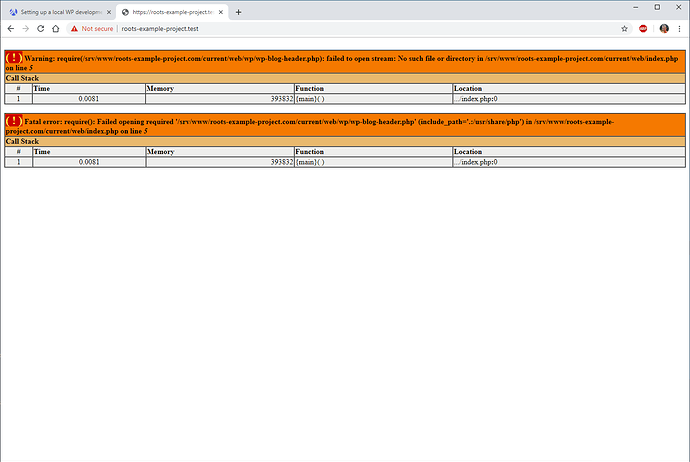Thanks for the timely responses alwaysblank, i do appreciate it. I know i’m a pain haha
This was the output:
ashley@DESKTOP-EKBG4DV:/mnt/c/Users/acell/Desktop/Sites/site1/trellis$ vagrant reload --provision
/mnt/c/Users/acell/Desktop/Sites/site1/trellis/Vagrantfile:1: warning: already initialized constant ANSIBLE_PATH
/mnt/c/Users/acell/Desktop/Sites/site1/trellis/Vagrantfile:1: warning: previous definition of ANSIBLE_PATH was here
/mnt/c/Users/acell/Desktop/Sites/site1/trellis/Vagrantfile:2: warning: already initialized constant ANSIBLE_PATH_ON_VM
/mnt/c/Users/acell/Desktop/Sites/site1/trellis/Vagrantfile:2: warning: previous definition of ANSIBLE_PATH_ON_VM was here
==> default: Attempting graceful shutdown of VM...
==> default: Checking if box 'bento/ubuntu-18.04' version '201906.18.0' is up to date...
==> default: Clearing any previously set forwarded ports...
==> default: Clearing any previously set network interfaces...
==> default: Preparing network interfaces based on configuration...
default: Adapter 1: nat
default: Adapter 2: hostonly
==> default: Forwarding ports...
default: 22 (guest) => 2222 (host) (adapter 1)
==> default: Running 'pre-boot' VM customizations...
==> default: Booting VM...
==> default: Waiting for machine to boot. This may take a few minutes...
default: SSH address: 127.0.0.1:2222
default: SSH username: vagrant
default: SSH auth method: private key
==> default: Machine booted and ready!
==> default: Checking for guest additions in VM...
==> default: Setting hostname...
==> default: Configuring and enabling network interfaces...
==> default: Mounting shared folders...
default: /vagrant => /mnt/c/Users/acell/Desktop/Sites/site1/trellis
default: /home/vagrant/trellis => /mnt/c/Users/acell/Desktop/Sites/site1/trellis
default: /home/vagrant/trellis/bin => /mnt/c/Users/acell/Desktop/Sites/site1/trellis/bin
default: /srv/www/roots-example-project.com/current => /mnt/c/Users/acell/Desktop/Sites/site1/site
==> default: Running provisioner: ansible...
default: Running ansible-galaxy...
- changing role composer from 1.7.0 to 1.7.0
- downloading role 'composer', owned by geerlingguy
- downloading role from https://github.com/geerlingguy/ansible-role-composer/archive/1.7.0.tar.gz
- extracting composer to /mnt/c/Users/acell/Desktop/Sites/site1/trellis/vendor/roles/composer
- composer (1.7.0) was installed successfully
- changing role ntp from 1.6.0 to 1.6.0
- downloading role 'ntp', owned by geerlingguy
- downloading role from https://github.com/geerlingguy/ansible-role-ntp/archive/1.6.0.tar.gz
- extracting ntp to /mnt/c/Users/acell/Desktop/Sites/site1/trellis/vendor/roles/ntp
- ntp (1.6.0) was installed successfully
- changing role logrotate from v0.0.5 to v0.0.5
- downloading role 'logrotate', owned by nickhammond
- downloading role from https://github.com/nickhammond/ansible-logrotate/archive/v0.0.5.tar.gz
- extracting logrotate to /mnt/c/Users/acell/Desktop/Sites/site1/trellis/vendor/roles/logrotate
- logrotate (v0.0.5) was installed successfully
- changing role swapfile from v2.0.6 to v2.0.6
- downloading role 'swapfile', owned by oefenweb
- downloading role from https://github.com/Oefenweb/ansible-swapfile/archive/v2.0.6.tar.gz
- extracting swapfile to /mnt/c/Users/acell/Desktop/Sites/site1/trellis/vendor/roles/swapfile
- swapfile (v2.0.6) was installed successfully
- changing role mailhog from 2.1.3 to 2.1.3
- downloading role 'mailhog', owned by geerlingguy
- downloading role from https://github.com/geerlingguy/ansible-role-mailhog/archive/2.1.3.tar.gz
- extracting mailhog to /mnt/c/Users/acell/Desktop/Sites/site1/trellis/vendor/roles/mailhog
- mailhog (2.1.3) was installed successfully
[WARNING]: - dependency geerlingguy.daemonize from role mailhog differs from
already installed version (1.2.1), skipping
default: Running ansible-playbook...
PLAY [Set ansible_python_interpreter] ******************************************
TASK [python_interpreter : Get Ubuntu release] *********************************
System info:
Ansible 2.5.1; Vagrant 2.2.5; Linux
Trellis 1.0.3: April 30th, 2019
---------------------------------------------------
Failed to connect to the host via ssh: Bad owner or permissions on
/home/ashley/.ssh/config
fatal: [default]: UNREACHABLE! => {"changed": false, "unreachable": true}
to retry, use: --limit @/mnt/c/Users/acell/Desktop/Sites/site1/trellis/dev.retry
PLAY RECAP *********************************************************************
default : ok=0 changed=0 unreachable=1 failed=0
Ansible failed to complete successfully. Any error output should be
visible above. Please fix these errors and try again.
So i cd’ed to the file that i was struggling with and did a
chmod 744 config
and then re-ran this from the trellis folder
vagrant reload --provision
Loading composer repositories with package information Installing
dependencies (including require-dev) from lock file Package operations: 12
installs, 0 updates, 0 removals - Installing composer/installers (v1.6.0):
Downloading (100%) Plugin installation failed, rolling back - Removing
composer/installers (v1.6.0) [RuntimeException] Could not delete /srv/www
/roots-example-project.com/current/vendor/composer/installers/src/Composer:
install [–prefer-source] [–prefer-dist] [–dry-run] [–dev] [–no-dev]
[–no-custom-installers] [–no-autoloader] [–no-scripts] [–no-progress]
[–no-suggest] [-v|vv|vvv|–verbose] [-o|–optimize-autoloader] [-a
|–classmap-authoritative] [–apcu-autoloader] [–ignore-platform-reqs] [–]
[]…
failed: [default] (item=roots-example-project.com) => {“changed”: false, “item”: “roots-example-project.com”, “stdout”: “Loading composer repositories with package information\nInstalling dependencies (including require-dev) from lock file\nPackage operations: 12 installs, 0 updates, 0 removals\n - Installing composer/installers (v1.6.0): Downloading (100%)\nPlugin installation failed, rolling back\n - Removing composer/installers (v1.6.0)\n\n \n [RuntimeException] \n Could not delete /srv/www/roots-example-project.com/current/vendor/composer/installers/src/Composer: \n \n\ninstall [–prefer-source] [–prefer-dist] [–dry-run] [–dev] [–no-dev] [–no-custom-installers] [–no-autoloader] [–no-scripts] [–no-progress] [–no-suggest] [-v|vv|vvv|–verbose] [-o|–optimize-autoloader] [-a|–classmap-authoritative] [–apcu-autoloader] [–ignore-platform-reqs] [–] []…\n\n”, “stdout_lines”: [“Loading composer repositories with package information”, “Installing dependencies (including require-dev) from lock file”, “Package operations: 12 installs, 0 updates, 0 removals”, " - Installing composer/installers (v1.6.0): Downloading (100%)“, “Plugin installation failed, rolling back”, " - Removing composer/installers (v1.6.0)”, “”, " ", " [RuntimeException] ", " Could not delete /srv/www/roots-example-project.com/current/vendor/composer/installers/src/Composer: ", " ", “”, “install [–prefer-source] [–prefer-dist] [–dry-run] [–dev] [–no-dev] [–no-custom-installers] [–no-autoloader] [–no-scripts] [–no-progress] [–no-suggest] [-v|vv|vvv|–verbose] [-o|–optimize-autoloader] [-a|–classmap-authoritative] [–apcu-autoloader] [–ignore-platform-reqs] [–] []…”, “”]}
RUNNING HANDLER [common : restart memcached] ***********************************
changed: [default]
RUNNING HANDLER [common : reload php-fpm] **************************************
changed: [default]
RUNNING HANDLER [common : reload nginx] ****************************************
changed: [default]
RUNNING HANDLER [common : perform nginx reload] ********************************
changed: [default]
RUNNING HANDLER [fail2ban : restart fail2ban] **********************************
changed: [default]
RUNNING HANDLER [ferm : restart ferm] ******************************************
skipping: [default]
RUNNING HANDLER [ntp : restart ntp] ********************************************
changed: [default]
RUNNING HANDLER [sshd : restart ssh] *******************************************
changed: [default]
RUNNING HANDLER [mariadb : restart mysql server] *******************************
changed: [default]
to retry, use: --limit @/mnt/c/Users/acell/Desktop/Sites/site1/trellis/dev.retry
PLAY RECAP *********************************************************************
default : ok=117 changed=82 unreachable=0 failed=1
Ansible failed to complete successfully. Any error output should be
visible above. Please fix these errors and try again.
